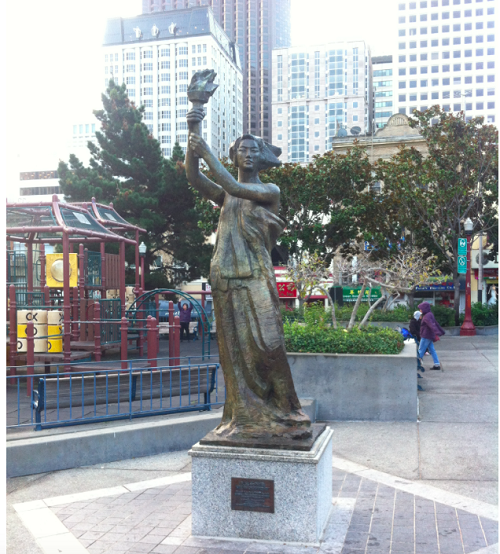 The Goddess of Democracy Statue, Portsmouth Square, San Francisco, Public Domain
The Goddess of Democracy Statue, Portsmouth Square, San Francisco, Public DomainSnapshot of Topic 1
Explore the topic's sub-chapters to learn more about the philosophical foundations of the United States political system.
Supporting Question
- What were the roots of the ideas that influenced the development of the United States political system?
Massachusetts Standards [8.T1.1-5]
- The Government of Ancient Athens
- The Government of the Roman Republic
- Enlightenment Thinkers and Democratic Government
- British Influences on American Government
- Native American Influences on American Government
Advanced Placement Standards for U.S. Government
- AP Government and Politics Unit 1.1: Ideas of Democracy
- AP Government and Politics Unit 1.2: Types of Democracy
Topic 1: The Philosophical Foundations of the United States Political System
Democracy comes from the Greek words “demos” and “kratos,” meaning "rule by the people" (Defining Democracy, Museum of Australian Democracy). Although the term does not appear in either the Declaration of Independence or the United States Constitution, democracy is the foundation for government in this country. Americans believe in government of the people, by the people, for the people.
Democracy, as a framework of government, has evolved over the centuries and now includes concepts that are the foundations of civic and political life in our country: freedom, justice, liberty, individual rights and responsibilities, shared power, and a system of checks and balances among the legislative, executive, and judicial branches of the government.
But, as researchers with the Varieties of Democracy project have noted, there is "no single agreed-upon list of what are (or aren't) issues of democracy" (FiveThirtyEight, September 1, 2021). Some think about issues of electoral democracy such as the importance of free elections and a free press while others focus on social and economic democracy and issues around women's rights, civil liberties, economic justice, voting access, and overcoming the historical legacies of slavery and discrimination against people of color.
Here you can find five types of democracy (electoral, liberal, participatory, deliberative, and egalitarian) and issues associated with them.
Here are the essential elements of democracy as defined by the United Nations Commission of Human Rights in 2000:
- Respect for human rights and fundamental freedoms
- Freedom of association
- Freedom of expression and opinion
- Access to power and its exercise in accordance with the rule of law
- The holding of periodic free and fair elections by universal suffrage and by secret ballot as the expression of the will of the people
- A pluralistic system of political parties and organizations
- The separation of powers
- The independence of the judiciary
- Transparency and accountability in public administration
- Free, independent and pluralistic media
Topic 1 explores the philosophical and historical origins of the United States system of democratic government, beginning with Ancient Athens and the Roman Republic and including how Enlightenment thinkers, North American colonial governments, and First People tribes influenced the writing of the Declaration of Independence, the Constitution, and the structure of U.S. government.
The governments and politics of Greece and Rome profoundly influenced America's founding generation. Comparing the educational backgrounds of George Washington, John Adams, Thomas Jefferson, and James Madison, historian Thomas E. Ricks (2020) found Greco-Roman learning was "part of the culture; a way of looking at the world and set of values."
Ricks notes further influences from Greece and Rome. The United States "Senate" meets at the "Capitol." Our political parties are "Republicans" or "Democrats." The Supreme Court's architecture recalls a Roman temple. Latin phrases are familiar parts of the legal and political vocabularies. The Roman word "virtue" (which in the 18th century meant putting the common good above self interest) appears some 6000 times in the writing of members of the Revolutionary generation. At the same time, the Founders, as with their ancient world predecessors, accepted human slavery and built that acceptance into the structures of American government as well as the fabric of American life.
 (make your own copy of this choice board to remix/share/use)
(make your own copy of this choice board to remix/share/use)Topic 1 Chapters